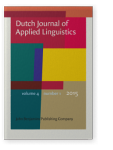Ob Italienisch Deutsch fördert
Warum Italienisch sprechende Kinder schneller Deutsch erwerben als einige andere Migrantengruppen in Deutschland
In this study, some extralinguistic factors were examined which might influence the language acquisition process in Italian and other immigrant preschool children acquiring German as their second or third language. The following methods of the language assessment were utilized: (a) a modified, validated version of language test Marburger Sprachscreening and (b) a classification of children as needing or not needing additional educational support in learning German. Italians scored significantly higher on vocabulary and grammar than other immigrant children. This can be attributed to the fact that Italians attended German nursery schools and played with German children after the daycare center time significantly more often than other immigrants. Immigrant groups with the most advanced German skills were English speaking children and Greeks. Linguistically weakest groups were Turks and Arabs. For these groups, dependence of the language acquisition process on extralinguistic factors was also shown.
Article language: German
References
Becker, B
(
2006)
Der Einfluss des Kindergartens als Kontext zum Erwerb der deutschen Sprache bei Migrantenkindern.
Zeitschrift für Soziologie, 35(6), 449–464.


Becker, B
(
2010)
Wer profitiert mehr vom Kindergarten? Die Wirkung der Kindergartenbesuchsdauer und Ausstattungsqualität auf die Entwicklung des deutschen Wortschatzes bei deutschen und türkischen Kindern.
Kölner Zeitschrift für Soziologie und Sozialpsychologie, 62(1), 139–163.


Biedinger, N., & Becker, B
(
2010)
Frühe ethnische Bildungsungleichheit: Der Einfluss des Kindergartenbesuchs auf die deutsche Sprachfähigkeit und die allgemeine Entwicklung. In
B. Becker &
D. Reimer (Hrsg.),
Vom Kindergarten bis zur Hochschule: Die Generierung von ethnischen und sozialen Disparitäten in der Bildungsbiographie (S. 49–79). Wiesbaden: VS Verlag für Sozialwissenschaften.


Bittner, D
(
2006)
Case before gender in the acquisition of German.
Folia Linguistica, 40(1–2), 115–134.


Blom, E., Paradis, J., & Sorenson Duncan, T
(
2012)
Effects of input properties, vocabulary size and L1 on the development of third person singular -s in child L2 English.
Language Learning, 62(3), 965–994.


Bundesamt für Migration und Flüchtlinge
(
2009)
Grunddaten der Zuwandererbevölkerung in Deutschland. Nürnberg: Bundesamt für Migration und Flüchtlinge.

Chondrogianni, V., & Marinis, T
Clahsen, H
(
1982)
Spracherwerb in der Kindheit. Eine Untersuchung zur Entwicklung der Syntax bei Kleinkindern. Tübingen: Gunter Narr Verlag.

Euler, H.A., Holler-Zittlau, I., Minnen, S. van, Sick, U., Dux, W., Zaretsky, Y., & Neumann, K
(
2010)
Psychometrische Gütekriterien eines Kurztests zur Erfassung des Sprachstandes vierjähriger Kinder.
HNO, 581, 1116–1123.


Fabiano-Smith, L., & Goldstein, B.A
(
2010)
Phonological acquisition in bilingual Spanish-English speaking children.
Journal of Speech, Language, and Hearing Research, 53(1), 160–178.


Grimm, H
(
2001)
Sprachentwicklungstest für drei- bis fünfjährige Kinder (SETK 3–5). Göttingen: Hogrefe.

Häusemann, J
(
2009)
Der Deutscherwerb von Vorschulkindern mit Migrationshintergrund.
Forum Logopädie, 3(23), 16–21.

Jia, G., & Aaronson, D
(
2003)
A longitudinal study of Chinese children and adolescents learning English in the United States.
Applied Psycholinguistics, 24(1), 131–161.


Jia, G., & Fuse, A
(
2007)
Acquisition of English grammatical morphology by native Mandarin-speaking children and adolescents: Age-related differences.
Journal of Speech, Language and Hearing Research, 50(5), 1280–1299.


Kratzmann, J., & Schneider, T
(
2009)
Soziale Ungleichheit beim Schulstart: Empirische Untersuchungen zur Bedeutung der sozialen Herkunft und des Kindergartenbesuchs auf den Zeitpunkt der Einschulung mit Daten der SOEP.
Kölner Zeitschrift für Soziologie und Sozialpsychologie, 61(2), 211–234.


Marouani, Z
(
2006)
Der Erwerb des Deutschen durch arabischsprachige Kinder. Doctoral dissertation, Heidelberg University.

Meisel, J.M
(
2009)
Second language acquisition in early childhood.
Zeitschrift für Sprachwissenschaft, 28(1), 5–34.

Neumann, K., Holler-Zittlau, I., Minnen, S. van, Sick, U., Zaretsky, Y., & Euler, H.A
(
2011)
Katzengoldstandards in der Sprachstandserfassung. Sensitivität und Spezifität des Kindersprachscreenings (KiSS).
HNO, 591, 97–109.


Paradis, J
(
2010)
Bilingual children’s acquisition of English verb morphology: Effects of language dominance, structure difficulty, and task type.
Language Learning, 60(3), 651–680.


Rothweiler, M., & Ruberg, T
(
2011)
Der Erwerb des Deutschen bei Kindern mit nicht-deutscher Erstsprache. Sprachliche und außersprachliche Einflussfaktoren. München: Deutsches Jugendinstitut.

Schmitz, K., Patuto, M., & Müller, N
(
2012)
The null-subject parameter at the interface between syntax and pragmatics: Evidence from bilingual German-Italian, German-French and Italian-French children.
First Language, 32(1–2), 205–238.


Turgay, K
(
2010)
Einige Aspekte zum Erwerb des Genus durch Kinder mit türkischer und italienischer Erstsprache.
Zeitschrift für angewandte Linguistik, 531, 1–29.


Wagner, L
(
2008)
SCREEMIK 2. Screening der Erstsprachfähigkeit bei Migrantenkindern (2. Aufl.). München: Eugen Wagner.

Yip, V., & Matthews, S
(
2007)
The bilingual child: Early development and language contact. Cambridge: Cambridge University Press.


Zaretsky, E., Neumann, K., Euler, H.A., & Lange, B.P
(
2013a)
Pluralerwerb im Deutschen bei russisch- und türkischsprachigen Kindern im Vergleich mit anderen Migranten und monolingualen Muttersprachlern.
Zeitschrift für Slawistik, 58(1), 43–71.


Zaretsky, E., Lange, B.P., Euler, H.A., & Neumann, K
(
2013b)
Acquisition of German pluralization rules in monolingual and multilingual children.
Studies in Second Language Learning and Teaching, 3(4), 553–581.


Zaretsky, E., Euler, H.A., Neumann, K., &Lange, B.P
(
2014)
Sociolinguistic predictors of language deficits in pre-school children with and without immigrant background. In
ACLL2014 — The Asian Conference on Language Learning. Conference Proceedings. Osaka
, Japan 2014 (pp. 42–53). Aichi: International Academic Forum.
Cited by
Cited by 2 other publications
Zaretsky, Eugen & Benjamin P. Lange
2022.
Strange Relations: When no German Spoken at Home is Associated with a Quick Progress in Acquiring German.
Studia Linguistica 76:2
► pp. 429 ff.

Zaretsky, Eugen & Benjamin P. Lange
2023.
Language-Specific Non-Words for the Assessment of Working Memory: Dealing With Bilingual Children.
Communication Disorders Quarterly 44:4
► pp. 219 ff.

This list is based on CrossRef data as of 1 july 2024. Please note that it may not be complete. Sources presented here have been supplied by the respective publishers.
Any errors therein should be reported to them.
